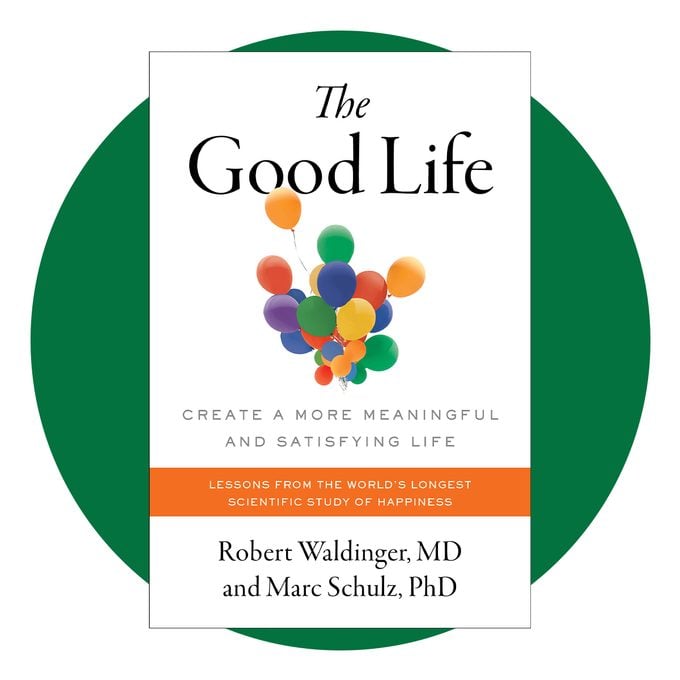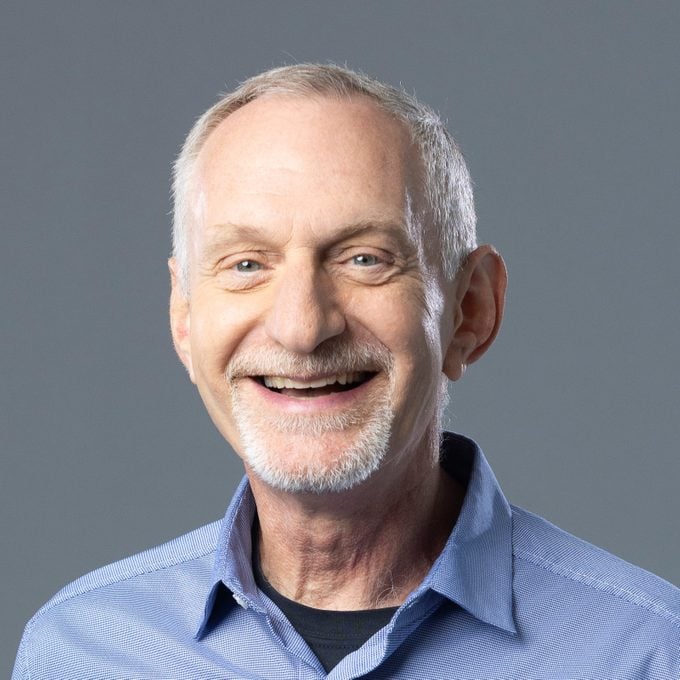People Who Did This One Thing at Age 50 Were the Healthiest at Age 80
Updated: Jul. 26, 2024

A new book from a renowned Harvard University doctor reveals why being happy is an even better predictor of a long life than your cholesterol levels are. Plus, his most shocking scientific discovery about how to become happy—all based on 100 years of Harvard health data.
Our editors and experts handpick every product we feature. We may earn a commission from your purchases.
Happy people live longer than unsatisfied folks—and, they’re more likely to enjoy good health during those extra years. This was one of the biggest findings of the ongoing Harvard Adult Development Study, the longest running study of adult health and happiness in the world.
Beginning in 1938, researchers followed 724 men throughout their lives and are now studying 1,300 of those participants’ children. The study’s been very involved, tracking data through detailed medical records and hundreds of in-person interviews and questionnaires. What they’ve learned so far has been published in a January 2023 book, The Good Life, co-authored by the current director of the study, Robert Waldinger, MD, and the assistant director, Marc Schulz, PhD.
Dr. Waldinger, who is also a psychiatrist at Massachusetts General Hospital and a professor of psychiatry at Harvard Medical School, recently chatted with The Healthy @Reader’s Digest about what really makes people happy, the most important thing you can do for your health. The study finding that surprised him the most. (Hint: it has nothing to do with whether or not you’re ticklish—one of the stranger questions that researchers have included on the study questionnaire for nearly 100 years. “I still have no idea why they put it on there originally, but we’ve kept it just in case!”)
The Happiness Diet: 7 Best Mood-Boosting Foods, from Nutrition and Brain Experts
Two myths about happiness you need to know

Before you can figure out what makes you happier, and therefore healthier, you first need to understand that you’ve been lied to about the source of true happiness, he says.
Happiness myth #1: Modern society is about making people happy
Despite the wide range of gadgets, products, entertainment, and self-help seminars touting to make you happy, the truth is that our current social structure isn’t designed for individual happiness and many of our modern institutions and conveniences are making us desperately unhappy.
‘I Left My Career in the City to Open a Plant Shop—and I’ve Never Been Happier’
“Life today is a haze of competing social, political, and cultural priorities, some of which have very little to do with improving people’s lives,” he says. “The modern world prioritizes many things ahead of the health and happiness of human beings.”
Here’s What Made Jessica Alba Decide Life ‘Can’t Revolve Around Career and Work’
Happiness myth #2: You know what will make you happy
Think you’ll know your happiness when you find it? When people were surveyed about what they thought would make them happy, the most common response was getting rich, followed by becoming famous, having a successful career, traveling a lot, and having an “easy” life. The truth? Absolutely none of those things, on their own, bring happiness.
This truth is shown starkly in the lives of John and Leo, profiled throughout the book. John was a wealthy lawyer with a Harvard education, coming from a prominent family and was well-known in his community. Leo was a high-school art teacher from a bad neighborhood, just eking out a living. Yet, John was the unhappiest man recorded in the history of the study, dying after decades of health problems, while Leo was the happiest, staying active and healthy nearly to the end.
Clearly money can’t buy health or happiness but why, exactly? The answer surprised even Dr. Waldinger.
Here’s How Exercise Reduces Stress: The 9 Best Moves That Brighten Your Mood
The most surprising finding on happiness

“In analyzing all that data, the thing that surprised me the most was finding that our relationships are the most important factor in happiness, and that how happy we are in our relationships has a powerful influence on our health,” he says. “The size of the effect was huge! The people who were the most satisfied in their relationships at age 50 were the healthiest at age 80.”
People who had a variety of close relationships—romantic partners, family, friends, or coworkers—were happier and healthier. What mattered, Dr. Waldinger says, wasn’t the nature of the relationship, nor how many relationships a person had, but rather the quality of their relationships.
“We found that human beings need exercise, nutrition, and a sense of purpose—but most of all, we need each other,” he says. “Taking care of your body is important, but tending to your relationships is a form of self-care too. That’s the revelation.”
It’s free to subscribe to The Healthy @Reader’s Digest daily newsletter
Health benefits of close relationships
The number-one best thing you can do to improve your health is to find, nurture, and preserve close relationships. One correlation researchers found: people’s reported satisfaction with their relationships at age 50 was a better predictor of physical health than their cholesterol levels were. In fact, having close relationships was a stronger predictor of overall health than IQ, social class, wealth, or genetics.
Here are just a few of the health benefits of relationships that they found:
- Less risk of heart disease or heart attacks
- Lower blood pressure
- Lower risk of chronic illnesses including Type II diabetes
- Less cognitive decline with aging
- Improved memory
- Stronger immune system
- Faster healing
- Less mental illness, including depression and anxiety
The key is that relationships help manage stress in a powerful way and when you lower the stress hormones, you lower inflammation in the body, which causes a wide range of health problems, he explains.
7 Major Health Effects of Expressing Gratitude in Relationships
The health habits a happiness researcher swears by
Most of the book focuses on relationships—so we asked Dr. Waldinger to share the health habits he personally practices. Here’s what he revealed:
- Walking two to three miles outdoors every morning
- Weight training twice a week
- Stretching three times a week
- Meditating daily
- Limiting time on social media, and using it to interact with others, rather than just scroll
- Having pets (he and his wife love keeping birds!)
- Focused attention, and no multitasking (“It doesn’t work anyhow, you’re not more productive overall.”)
- Reaching out to someone, to connect, daily
Queen Elizabeth’s 10 Daily Habits That Helped Her Live 96 Years
The question he gets asked the most about how to be happy
“When people hear about our research, so many people ask ‘Is it too late for me to be happy?’ and the answer is a resounding ‘No!’,” he says. “We found that about 40% of your happiness is under your direct control. It’s never too late to choose happiness.”
Choosing is the key—simply waiting for things to happen to you to make you happy is a highway to heartbreak. Happiness isn’t about what happens to you, but how you deal with it. “The good life is forged from precisely the things that make it hard,” he concludes.
And a large part of how you deal with those hard things is through building relationships. “Living in the midst of warm relationships is protective of both mind and body.”
So if you do just one thing for your health today, he recommends the final item on his personal list: think of someone, anyone, and connect with them. (In person is preferable, but a phone call or even text works too.) In other words: science says call your mom.


















